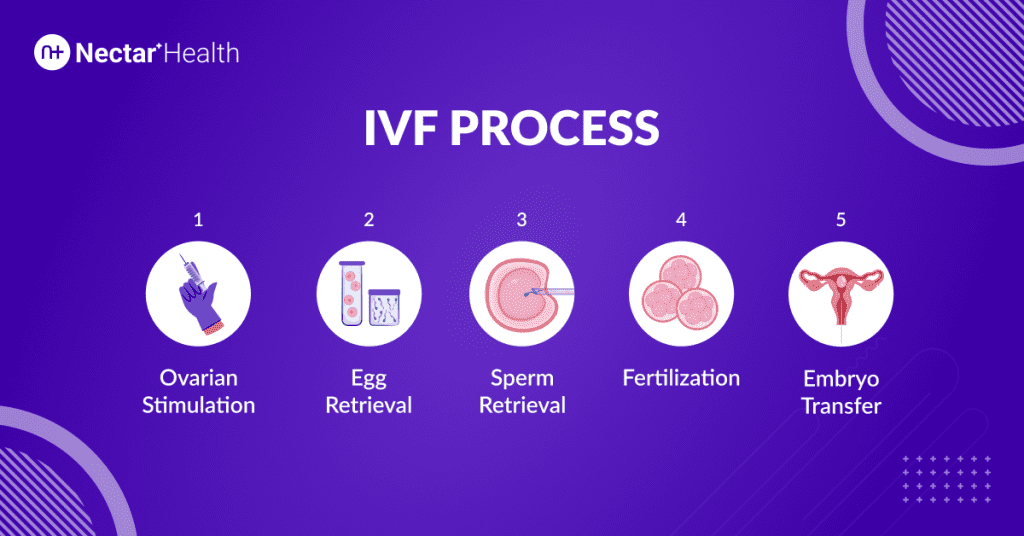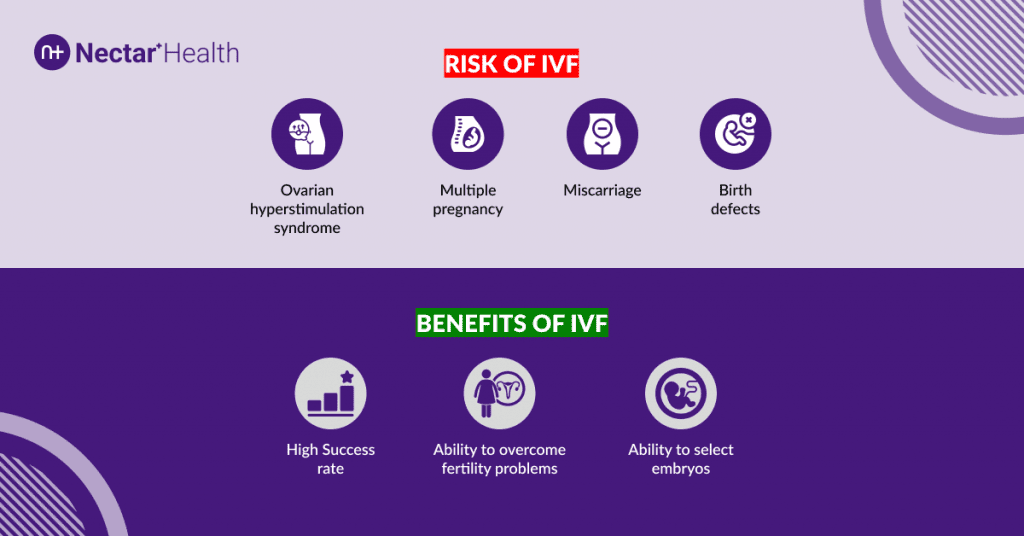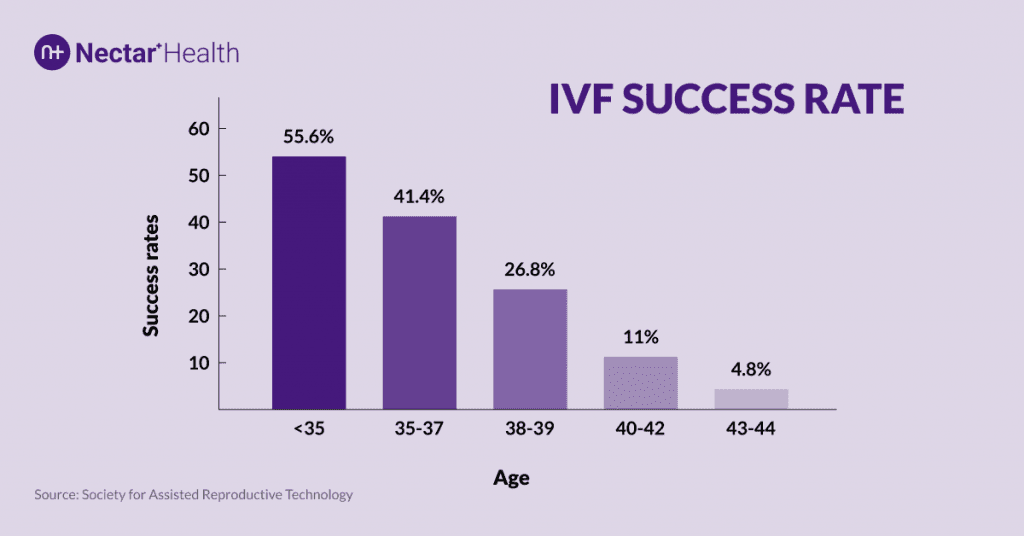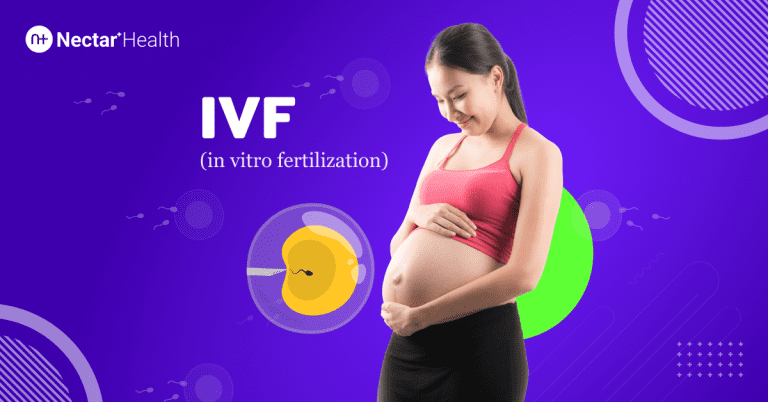What is IVF?
In vitro fertilization (IVF) is a type of assisted reproductive technology (ART) that involves combining eggs and sperm outside of the body in a laboratory dish. The fertilized eggs, called embryos, are then transferred to the uterus, where they may implant and grow into a baby.
IVF is used to treat a variety of fertility problems, including:
- Unexplained infertility
- Blocked or damaged fallopian tubes
- Male factor infertility
- Ovulation disorders
- Endometriosis
- Premature ovarian failure
- Genetic disorders
How does IVF work?
The IVF process typically takes about 6-8 weeks. It involves the following steps:
- Ovulation induction: The woman takes fertility medications to stimulate the ovaries to produce multiple eggs.
- Egg retrieval: The eggs are retrieved from the ovaries using a thin needle inserted through the vagina. This is a minor surgical procedure that is usually performed under sedation.
- Sperm collection: The man provides a sperm sample.
- Fertilization: The eggs and sperm are combined in a laboratory dish. The sperm will fertilize the eggs, and embryos will begin to develop.
- Embryo transfer: One or more embryos are transferred to the uterus using a thin tube inserted through the vagina. This is a minor procedure that is usually performed without anesthesia.
The woman will then take medication to support the pregnancy and undergo regular blood tests and ultrasounds to monitor the pregnancy.
What are the steps in IVF?

The steps in IVF are as follows:
- Ovulation induction: The woman takes fertility medications to stimulate the ovaries to produce multiple eggs. This is usually done by taking oral medications or by injecting herself with hormones.
- Egg retrieval: The eggs are retrieved from the ovaries using a thin needle inserted through the vagina. This is a minor surgical procedure that is usually performed under sedation.
- Sperm collection: The man provides a sperm sample. This can be done by masturbation or by using a testicular biopsy.
- Fertilization: The eggs and sperm are combined in a laboratory dish. The sperm will fertilize the eggs, and embryos will begin to develop.
- Embryo transfer: One or more embryos are transferred to the uterus using a thin tube inserted through the vagina. This is a minor procedure that is usually performed without anesthesia.
The woman will then take medication to support the pregnancy and undergo regular blood tests and ultrasounds to monitor the pregnancy.
Who is a candidate for IVF?
IVF is a good option for couples who have been unable to conceive after 6-12 months of trying to get pregnant on their own. It is also a good option for couples who have known fertility problems, such as blocked fallopian tubes or male factor infertility.
IVF may also be a good option for couples who:
- Want to have a child after age 35
- Have a genetic disorder that they do not want to pass on to their child
- Are single or in a same-sex relationship and want to have a child
What are the risks and benefits of IVF?

IVF is a safe and effective procedure, but it does have some risks. These risks include:
- Ovarian hyperstimulation syndrome (OHSS): This is a rare but serious condition that can occur when the ovaries overreact to fertility medications. OHSS can cause bloating, abdominal pain, and difficulty breathing.
- Multiple pregnancy: IVF can increase the risk of twins, triplets, or higher-order multiples. Multiple pregnancies are at risk for complications such as premature birth and low birth weight.
- Miscarriage: The likelihood of miscarriage is elevated in IVF compared to natural conception.
- Birth defects: The occurrence of birth defects exhibits a slight increase in IVF as opposed to natural pregnancy.
The benefits of IVF include:
- High success rates: IVF has high success rates, especially for younger women.
- Ability to overcome fertility problems: IVF can help couples with a variety of fertility problems to conceive and have a child.
- Ability to select embryos: IVF allows couples to select embryos for transfer based on genetic testing, which can reduce the risk of passing on genetic disorders to their child.
How much does IVF cost?
The cost of IVF in India varies depending on a number of factors, including the location of the clinic, the type of IVF treatment used, and the number of cycles required. However, in general, IVF is much more affordable in India than in the United States. The average cost of one cycle of IVF in India is about ₹1,00,000 to ₹3,50,000 (approximately $1,317 to $4,610).
Many insurance plans in India cover IVF, but there is a wide range of coverage. Some plans cover the entire cost of IVF, while others cover only a portion of the cost. It is important to check with your insurance company to see what coverage you have for IVF.
What are the success rates of IVF?

The success rates of IVF vary depending on a number of factors, including the woman’s age, the cause of infertility, and the number of eggs retrieved. However, in general, IVF has high success rates, especially for younger women.
According to the Society for Assisted Reproductive Technology (SART), the live birth rate for IVF in 2021 was as follows:
- Women under 35: 55.6%
- Women 35-37: 41.4%
- Women 38-39: 26.8%
- Women 40-42: 11.0%
- Women 43-44: 4.8%
It is important to note that these are just averages. The actual success rate for a given woman may be higher or lower depending on her individual circumstances.
If you are considering IVF, it is important to talk to your doctor about your chances of success. They can assess your individual circumstances and give you a more accurate estimate of your chances of having a baby.
Why do IVF treatments fail?
IVF treatments can fail for a variety of reasons, including:
- Early Ovulation: This phenomenon transpires when eggs are prematurely discharged from the ovaries, well before reaching full maturation.
- No eggs developing: This can be due to a number of factors, such as age, menopause, or ovarian failure.
- Too many eggs developing: This can be a side effect of the fertility medications used in IVF.
- Egg is not fertilized by sperm: This can be due to problems with the sperm or with the egg.
- Sperm quality: This can be a factor in IVF failure, especially if the man has low sperm count, poor sperm motility, or abnormal sperm morphology.
- Embryo stops growing or will not implant: This can be due to a number of factors, including genetic abnormalities, uterine problems, or immunological issues.
- Problems with egg retrieval or embryo transfer: These can be technical errors that occur during the IVF process.
- If your IVF cycle fails, it is important to talk to your doctor about the reasons why. They can help you to assess your individual situation and to develop a new treatment plan that is more likely to be successful.
Here are some tips for increasing your chances of success with IVF:
- Choose a good clinic. IVF clinics vary in terms of their success rates. It is important to choose a clinic with a good reputation and a high success rate.
- Live a healthy lifestyle. Maintaining a healthy weight, eating a balanced diet, and exercising regularly can improve your chances of success with IVF.
- Manage stress. Stress can reduce your chances of success with IVF. Find healthy ways to manage stress, such as yoga, meditation, or spending time in nature.
- Be patient. It may take multiple cycles of IVF to achieve a pregnancy. Be patient and don’t give up.
What are the alternatives to IVF?
There are a number of alternatives to IVF, depending on the specific cause of infertility. Some of the most common alternatives to IVF include:
- Intrauterine insemination (IUI): IUI is a technique involving the direct placement of sperm into the uterus, achieved through either a catheter or a syringe. It is a common choice for couples facing unexplained infertility, mild male factor infertility, or cervical factor infertility.
- Surgery: Surgery may be an option for couples with certain fertility problems, such as blocked fallopian tubes or endometriosis. Surgery can be used to correct the underlying problem and improve the chances of conception.
- Donor sperm or eggs: If a couple is unable to conceive using their own sperm or eggs, they may choose to use donor sperm or eggs. This can be a good option for couples with male factor infertility, female factor infertility, or genetic disorders.
Other alternatives to IVF include:
- Timed intercourse: Timed intercourse is a method of conception in which couples have sex at specific times during the woman’s menstrual cycle to increase the chances of conception. This can be done using ovulation predictor kits or by monitoring the woman’s basal body temperature.
- Natural fertility treatments: Natural fertility enhancements encompass a range of holistic approaches aimed at boosting the likelihood of conception. These strategies encompass the use of herbal supplements, maintaining a well-balanced diet, and engaging in regular physical activity.
- Adoption: Adoption is a process of legally taking on the responsibility of raising a child that is not biologically related to you. There are many different types of adoption, including domestic adoption, international adoption, and foster care adoption.
If you are struggling to conceive, it is important to talk to your doctor about your options. They can help you to determine the best course of treatment for you and your partner.
Frequently Asked Questions (FAQ)
Are there any risks or side effects associated with IVF?
IVF can have side effects like bloating, mood swings, and mild discomfort. Rare complications may include ovarian hyperstimulation syndrome (OHSS), multiple pregnancies, and the risk of ectopic pregnancy. Discuss potential risks with your fertility specialist.
What should I expect during and after the IVF process emotionally and physically?
IVF can be emotionally and physically challenging. It's important to be prepared for potential emotional ups and downs and to seek support from a therapist or support group if needed. Physically, expect some discomfort, but recovery is typically quick.
Is sperm needed in IVF?
Yes, sperm is typically required for IVF. It is used to fertilize the retrieved eggs, either from the male partner or, in some cases, from a sperm donor.
What is the cost of IVF in India?
The cost of IVF in India can vary widely depending on the clinic, location, and specific treatment protocols. On average, it can range from INR 1,00,000 to INR 2,50,000 per cycle, but costs may be higher for additional services or advanced procedures.
How many sperm to get pregnant?
Typically, it takes just one healthy sperm to fertilize an egg and result in pregnancy. However, during a single ejaculation, a man can release millions of sperm to enhance the chances of fertilization.










